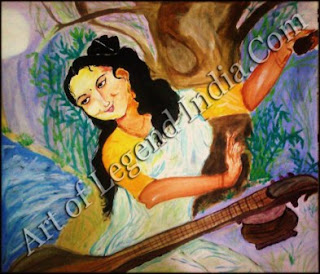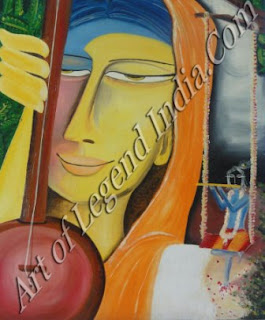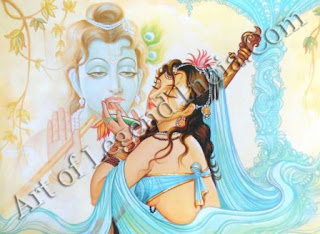
In the
beginning was the soul merged in the Lord and with the Lord. But since then
aeons have passed and the soul has left its abode of peace, where it lay
wrapped in bliss. The ignorance persisting for ages, and the association with
the grosser elements of matter and ego have covered the subtler element to such
an extent that the spirit has apparently become benumbed. In the innermost core
it is still alive, but the covers that it has put on have made it insensible to
the Call. It has lost its sensibilities, and has become insensate to the shafts
of love. They cannot pierce the dense layers the soul has put on. But at times
it so happens that, when they do pierce, the experience, howsoever shortlived
gives a thrill; but this effect is soon masked by the external reactions. If
this temporary selflessness is allowed to sustain itself a little longer, real
love will spring forth. These temporary flashes are not of much value to a
devotee, not very praiseworthy even. They cannot lead the pilgrim Home. The
successful termination of the journey presumes sustained effort and consequent
joy.
Once
this Bhakti is aroused in this frame, it begins to respond to the Eternal; the
soul then starts upwards to the real home.
The
soul has since its departure from the eternal Home been enjoying itself with
the mind and the body Like the proverbial spendthrift, it is sharing with these
cheats the boon of its Home. Like an ignorant child, it has fallen into bad
company and is every day descending lower and lower in search of new pleasures
of a vulgar type, which makes its redemption impossible. But, before the final
wreck comes, it makes amends to the Father, and is forgiven. It then begins its
career afresh. It only takes time to rise to the old place once more. This
often happens when it is reminded in its fallen condition of its glorious past
and is assured of the forgiving nature of the Father. The innate goodness is
then aroused in the child. Then it realizes that these thieves the body and the
mind which were to all appearances its companions, were really enjoying at its
cost, as the soul was the only life-giving element. The covers of depravity are
removed, it repents and then the Lord appears and makes it conscious of its
fallen condition and of His mighty forgiving nature. This realization is bound
to come, as the connection of the soul is yet unbroken with the Lord. When such
a stage is reached, the Guru makes His appearance. The Guru knows the secrets
of the Divine Path, and understands the malady of the aspirant. He ministers to
the ailment of his new patient. To the aspirant he describes his fall and points
out to him the path, following which he can reach Home. This path is nothing
else but the current of divine love that leads the individual towards the
Eternal Soul. If this route were not extant, the individual soul would never
experience the thrills from the Universal. The soul, when it lay in the Ocean
of Divinity, was lying silent, calm and unruffled; but, when it started its
journey downward, the loss of energy in the motion resulted in its depletion,
and this process of fall produced sound. This sound is technically termed abda
in Vedanta and Yoga. At the various stages in its descent the soul adopted the
form and the colour of the centre through which it passed. In our world it
assumed the form of `Manas' and `Maya'. If now the soul wants to return Home,
it has to retrace its path; it has once more to draw together all the energy it
had diffused and then to proceed backwards. Just as in the wilderness in this
world the traveller is guided by the sound at a distance, so also the soul on
its pilgrimage is guided by the Sabda. It is the open sesame of the Divine
Home.
 The soul moves on and on in reponse to it. As the sound grows clearer
with the soul's advance in its upward march, the speed also increases. Like the
snake that gets spell-bound itself when it hears the music of the charmer's
flute, the soul drinks deep of the eternal music that issues forth from itself.
This music of the soul is also called by the Yogis as Anahata and by the
St-ills as Saut-i-sarmadi, the music without a beginning and an end, which
never stops. When the music of this world appeals to one so much, one can
easily imagine what must be the condition of the soul when it hears this divine
music all the time. This music the soul has brought with itself. It sustains
it. It is under its influence that the devotee goes into trances. It is the
password to reach Home. Mira called this Sabda NAMA'. Without Nama', she
incessantly repeated, you cannot reach Him. It is, in fact, the realization by
man of his divinity. But this, she repeated, could be possible only through the
help of the Teacher. And the Teacher will come only when the aspirant lies ill,
crying for the beatific vision. He gives the gift of NAMA', and the path
becomes accessible to the recipient.
The soul moves on and on in reponse to it. As the sound grows clearer
with the soul's advance in its upward march, the speed also increases. Like the
snake that gets spell-bound itself when it hears the music of the charmer's
flute, the soul drinks deep of the eternal music that issues forth from itself.
This music of the soul is also called by the Yogis as Anahata and by the
St-ills as Saut-i-sarmadi, the music without a beginning and an end, which
never stops. When the music of this world appeals to one so much, one can
easily imagine what must be the condition of the soul when it hears this divine
music all the time. This music the soul has brought with itself. It sustains
it. It is under its influence that the devotee goes into trances. It is the
password to reach Home. Mira called this Sabda NAMA'. Without Nama', she
incessantly repeated, you cannot reach Him. It is, in fact, the realization by
man of his divinity. But this, she repeated, could be possible only through the
help of the Teacher. And the Teacher will come only when the aspirant lies ill,
crying for the beatific vision. He gives the gift of NAMA', and the path
becomes accessible to the recipient.
The
love for the Gum must be unadulterated, unselfish and spontaneous. The Guru is
he who will open the gate that guards the entrance to the Divine Throne. There
must be implicit faith in him. Divided affection is abhorred by him. An honest
heart wins him over. How tenderly Mira loved her Guru and with what tenacity,
is depicted by her in her beautiful lines, full of pathos and music and
brimming with genuine feelings of affection and respect for the Teacher.

How
many are those honest people that have the stern faith and hope in the Teacher?
It is very nice to sit philosophizing that the world is a dream. But these are
only pious thoughts. The poet is more honest (I say honest, not correct) when
he says: 'Life is real' and 'not a dream'. Because he says what he sees But the
Teacher will open the devotee's eyes and show him the hypocrisy of the world
and its transient nature. It will be only then that in disgust he will turn his
back from the world and realize that is was a dream. This hollowness will be
shown to him as a stern reality as God was shown to Vivekananda by his Teacher,
Swami Ramakrsna Paramahathsa, as a being that 'stood face to face with him and
conversed with him.' But one who for ages has been enjoying the wine
administered by the body and the mind can seldom get out of the stereotyped rut
to breathe the pure fresh air.
The
soul in this world has put on covers with which it enjoys when it dives deep
into the quagmire of sensuality. It is difficult for it to shake them off. It
is only after removing these covers of dirt that it can follow the path of
love, so difficult and narrow many are prepared to follow this path with
equilibrium and resolve maintained throughout. Although every-one is ready with
his gospel and is up to deliver a sermon on the virtues of a devotee's life and
the glories of the Path yet very few find the Teacher, still less obtain his
favours. On whomsoever he showers his blessings, he takes him in his company,
reveals to him the secrets of the Path and leads him Home. That is the
beginning of real LOVE, the love that is synonymous with the Lord. The eye
sees, with its senses intact, 'camels pass through the eye of the needle' and
the 'seas drown in the boat.
To meet
the Lord is easy, to discover His lover is difficult.' This is not a truism,
but a truth. When the soul proceeds with implicit faith in the Teacher, this
automatically happens when the Teacher shows to the devotee his real form, then
it reaches Home and merges itself in divinity. Everything it sees there is its
own. It dances in ecstasy when it sees its Lord. On one side stands the Teacher
and on the other it witnesses the Lord in full effulgence. In a dilemma it
finds itself.
And it
falls on the feet of its Teacher, unable to understand its own action and
decision. The Lord smiles and clasps the soul to His bosom. It feels the warmth
of the embrace. It revives from its slumber and tastes of the eternal life.
This is life immortal which it now gets. The way is through the Teacher, who is
to impart the knowledge of the abda. There is no other way in this Kali age.
Prepare for His arrival; for, sooner or later, He is bound to come. You are to
be equipped, not with the riches and the wealth of the world, but with a poor
man's heart, a heart that will burst forth into tears of joy at His name and in
which the waves of love are constantly rising, leaving no space for any other
love besides that for the Holy One.
The
inception of love is the result of the ascent of the accumulated energy
upwards. The way upwards is through the Guru.
Mira
was imbued with similar feelings. She cried, "Take the torch of
`Guru-Thana' and steer clear through the abysmal darkness of the world."
What she said will be understood only by those who have passed through the path
traversed by that great devotee. The fidelity required in this domain is too
taxing, nay, boring at times, for the soul that has started suddenly and with
great vigour at the very outset. It staggers at the first shock it receives, as
it is yet raw in the sense of lacking in the support of the Guru. But, when the
Guru is met, the watchword of the soul is "Always with the Guru."
This is the sign of emancipation, and, sooner or later, every soul must crave
for the divine support. Then redemption is not far off. Else, like the many, it
also finds a place in some abyss. The onlookers have watched with careless eyes
the wrecking of many boats, but they have never cared to diagnose the cause.
The phantom of death, as the dear ones have been carried on the bier, has
haunted them only for a moment. The realization has been short-lived. The
attention is carried again to the wrangles of the world, and once again the
soul is drowned in the sea of pain and pleasure, steeped in the desire of the
world, in its joys and in its sorrows. The momentary flash does cross at least once
everybody's life, and many a pious resolution is then arrived at, and solemn
promise made thenceforth to follow a course that may lead Home. But their
unstable position soon wrecks them on the rocks of worldliness. When once
caught in its meshes, no amount of frowning or fawning will avail them. But
even then, if he were to realize the greatness of the soul and follow its
dictates to the last, there is every chance of redemption. The Teacher will
give the devotee the strength to fight the blandishments and snares of Maya and
Kala and ultimately tow his boat unperturbed through the gushing current. Few
realize the boon the Teacher confers although everybody is familiar with the
prevailing practice in big households. The entry there is regulated by permits.
It is therefore not a matter for surprise that the divine preserves should be
protected by these saints, who act as the repositories of divine secrets,
mysteries and knowledge. If the Cela is ready, he whispers the password, and
with its help the aspirant reaches the unexplored region.
 The
Guru tells how the descent began and the agonies of the soul commenced. He
knows it, as he has the experience of that region. When the ingress into the
region of darkness has been through doors of pain, the way back must surely
likewise be decked with wreaths of tears, not burning tears this time, but the
soothing draughts that quench the thirst of the soul. Seeing the wilderness in
front and the uncertainty in the result of the espoused cause, the tiro does
not grip the opportunity offered to him, but allows himself to be washed with
the downward current into the region of abysmal darkness. The proverbial
laziness in man, coupled with his love for pleasure does not permit him to
steer through and beyond the rushes of Maya. He is afraid of being drowned and
desires to come out unbruised. Thus, when a beginner finds after some time that
the path is too difficult for him, he abandons it immediately. Thereupon the
sparks of renunciation convert themselves into strong chains of worldliness,
thus preparing the way to Hell. The solitary stars shine in the firmament of
time; while some have persevered and others have sneered, the devotees have
worn expectant looks. They have sat helpless and penitent, awaiting the
motherly touch to come and take them up. And the mother has come. Their hopes
have not been frustrated. The Teachers have come and opened the portals for
them. There drinks the soul the nectar of bliss, unable to find words in which
to express gratitude to the Teacher. In no words can it pay tribute to him, the
repository of the GREAT MYSTERY, who unlocks the mysteries that lie unfathomed
in the recesses of the heart.
The
Guru tells how the descent began and the agonies of the soul commenced. He
knows it, as he has the experience of that region. When the ingress into the
region of darkness has been through doors of pain, the way back must surely
likewise be decked with wreaths of tears, not burning tears this time, but the
soothing draughts that quench the thirst of the soul. Seeing the wilderness in
front and the uncertainty in the result of the espoused cause, the tiro does
not grip the opportunity offered to him, but allows himself to be washed with
the downward current into the region of abysmal darkness. The proverbial
laziness in man, coupled with his love for pleasure does not permit him to
steer through and beyond the rushes of Maya. He is afraid of being drowned and
desires to come out unbruised. Thus, when a beginner finds after some time that
the path is too difficult for him, he abandons it immediately. Thereupon the
sparks of renunciation convert themselves into strong chains of worldliness,
thus preparing the way to Hell. The solitary stars shine in the firmament of
time; while some have persevered and others have sneered, the devotees have
worn expectant looks. They have sat helpless and penitent, awaiting the
motherly touch to come and take them up. And the mother has come. Their hopes
have not been frustrated. The Teachers have come and opened the portals for
them. There drinks the soul the nectar of bliss, unable to find words in which
to express gratitude to the Teacher. In no words can it pay tribute to him, the
repository of the GREAT MYSTERY, who unlocks the mysteries that lie unfathomed
in the recesses of the heart.
Writer – Bankey Behari
 The soul moves on and on in reponse to it. As the sound grows clearer
with the soul's advance in its upward march, the speed also increases. Like the
snake that gets spell-bound itself when it hears the music of the charmer's
flute, the soul drinks deep of the eternal music that issues forth from itself.
This music of the soul is also called by the Yogis as Anahata and by the
St-ills as Saut-i-sarmadi, the music without a beginning and an end, which
never stops. When the music of this world appeals to one so much, one can
easily imagine what must be the condition of the soul when it hears this divine
music all the time. This music the soul has brought with itself. It sustains
it. It is under its influence that the devotee goes into trances. It is the
password to reach Home. Mira called this Sabda NAMA'. Without Nama', she
incessantly repeated, you cannot reach Him. It is, in fact, the realization by
man of his divinity. But this, she repeated, could be possible only through the
help of the Teacher. And the Teacher will come only when the aspirant lies ill,
crying for the beatific vision. He gives the gift of NAMA', and the path
becomes accessible to the recipient.
The soul moves on and on in reponse to it. As the sound grows clearer
with the soul's advance in its upward march, the speed also increases. Like the
snake that gets spell-bound itself when it hears the music of the charmer's
flute, the soul drinks deep of the eternal music that issues forth from itself.
This music of the soul is also called by the Yogis as Anahata and by the
St-ills as Saut-i-sarmadi, the music without a beginning and an end, which
never stops. When the music of this world appeals to one so much, one can
easily imagine what must be the condition of the soul when it hears this divine
music all the time. This music the soul has brought with itself. It sustains
it. It is under its influence that the devotee goes into trances. It is the
password to reach Home. Mira called this Sabda NAMA'. Without Nama', she
incessantly repeated, you cannot reach Him. It is, in fact, the realization by
man of his divinity. But this, she repeated, could be possible only through the
help of the Teacher. And the Teacher will come only when the aspirant lies ill,
crying for the beatific vision. He gives the gift of NAMA', and the path
becomes accessible to the recipient. The
Guru tells how the descent began and the agonies of the soul commenced. He
knows it, as he has the experience of that region. When the ingress into the
region of darkness has been through doors of pain, the way back must surely
likewise be decked with wreaths of tears, not burning tears this time, but the
soothing draughts that quench the thirst of the soul. Seeing the wilderness in
front and the uncertainty in the result of the espoused cause, the tiro does
not grip the opportunity offered to him, but allows himself to be washed with
the downward current into the region of abysmal darkness. The proverbial
laziness in man, coupled with his love for pleasure does not permit him to
steer through and beyond the rushes of Maya. He is afraid of being drowned and
desires to come out unbruised. Thus, when a beginner finds after some time that
the path is too difficult for him, he abandons it immediately. Thereupon the
sparks of renunciation convert themselves into strong chains of worldliness,
thus preparing the way to Hell. The solitary stars shine in the firmament of
time; while some have persevered and others have sneered, the devotees have
worn expectant looks. They have sat helpless and penitent, awaiting the
motherly touch to come and take them up. And the mother has come. Their hopes
have not been frustrated. The Teachers have come and opened the portals for
them. There drinks the soul the nectar of bliss, unable to find words in which
to express gratitude to the Teacher. In no words can it pay tribute to him, the
repository of the GREAT MYSTERY, who unlocks the mysteries that lie unfathomed
in the recesses of the heart.
The
Guru tells how the descent began and the agonies of the soul commenced. He
knows it, as he has the experience of that region. When the ingress into the
region of darkness has been through doors of pain, the way back must surely
likewise be decked with wreaths of tears, not burning tears this time, but the
soothing draughts that quench the thirst of the soul. Seeing the wilderness in
front and the uncertainty in the result of the espoused cause, the tiro does
not grip the opportunity offered to him, but allows himself to be washed with
the downward current into the region of abysmal darkness. The proverbial
laziness in man, coupled with his love for pleasure does not permit him to
steer through and beyond the rushes of Maya. He is afraid of being drowned and
desires to come out unbruised. Thus, when a beginner finds after some time that
the path is too difficult for him, he abandons it immediately. Thereupon the
sparks of renunciation convert themselves into strong chains of worldliness,
thus preparing the way to Hell. The solitary stars shine in the firmament of
time; while some have persevered and others have sneered, the devotees have
worn expectant looks. They have sat helpless and penitent, awaiting the
motherly touch to come and take them up. And the mother has come. Their hopes
have not been frustrated. The Teachers have come and opened the portals for
them. There drinks the soul the nectar of bliss, unable to find words in which
to express gratitude to the Teacher. In no words can it pay tribute to him, the
repository of the GREAT MYSTERY, who unlocks the mysteries that lie unfathomed
in the recesses of the heart.













0 Response to "The Doctraine of Sabda"
Post a Comment